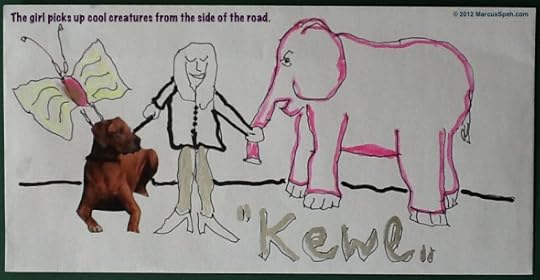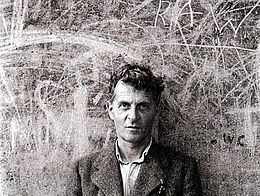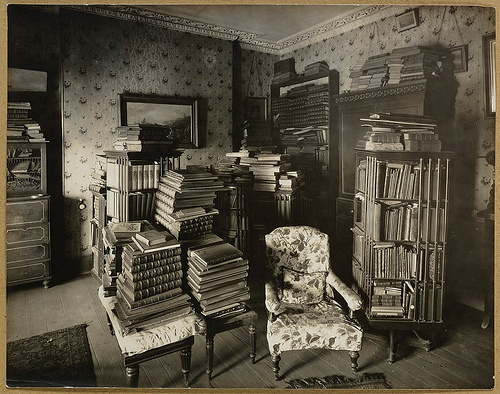Marcus Speh's Blog, page 10
July 3, 2012
Wrestling existential elephants
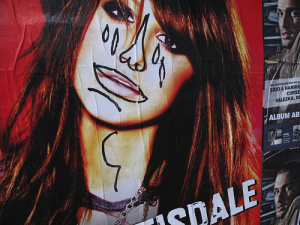
Photo: Bruce Spear, La femme qui pleure
Been wrestling the existential elefant while the sky cried. Not long ago, my tax adviser, who was also my friend, died of lung cancer. How’s that for a sombre beginning to a blog post. Almost bloody. His English wasn’t good and I presume his ghost can’t or won’t follow me here. He always made me feel bad for writing in English…I feel a little small-minded saying this. After all, I’m talking about both death and taxes, here…this was one of those days that will remain nameless: without title. What does it take to change that? Death you’d think would achieve it and indeed, I can name the days of death in my life: they were creative days, too, because to get through them sanely required a creative effort. Most creative acts aren’t grimly death-defying, of course, they’re playfully beating eternity instead. I used to sit down at the piano alone at night when I felt sad. Make music that made me even more sad. Now I tend to look for musical language of sorrow instead. Sebald’s writing does that for me right now, terribly heavy-lidded stuff, lyrical moping, existential complaints at the highest artistic level. I never know if I should trust the beautiful lady La Tristezza: «La tristezza è un’emozione contraria alla gioia e alla felicità». Sat in the car this afternoon: flag flying at half-mast, I was preparing myself for a blue ride home, when suddenly everything fell into place for no particular reason. Suddenly I knew everything was going to be okay. Never mind those odds: they’re computed by grumpy dwarves who don’t know the last thing about sun light, rain drops or pachydermata.
[#2 of 100 Days of Summer]








June 24, 2012
Lost words in London
I just spent a few days walking through London. Met writer pal Penny Goring in person for the first time, which was lovely and weird (meeting virtual people! Disturbing additional dimensions!) Wrote a lot, too, mostly at night, but when I came home, most of it had disappeared from my iPad. Perhaps this is a lesson in letting go, said my wife. Yes, or perhaps I caught a curse when I crossed the path of a Covent Garden gypsy. Or maybe the story, created in London, was never meant to be read outside of town and as soon as I get back to London it’ll magically reappear on my screen. There’s an uncanny dimension to writing digitally. Especially when you can only write with five fingers of the left hand as I. It turns every line into a spell. The photo above alludes to my favorite trophy from London: by accident, I visited the Vollard Suite at the British Museum, which I found hugely inspiring in ways too early to assess but I can feel the old Pablo energy rush through my veins…and by way of an update: I’ve decided to abandon this blog for a new lightweight Tumblr presence here, since this particular blog is mostly about vanity, I believe, and feeding vanity just takes too much time. Summer’s slimming down time…
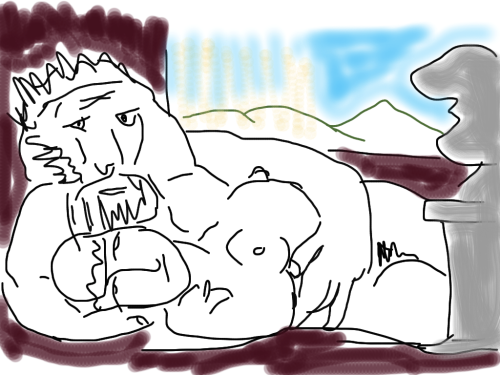
Digital drawing of Picasso’s etching Reclining Sculptor I (1933), using iPad app “Brushes”.
[#1 of 100 Days of Summer]








June 12, 2012
Kewl
The girl picks up creatures from the side of the road. They’re too exotic even for a freak show: the pink elephant who cannot stop talking about his failed marriage to a Swiss cuckoo though he always hated the regularity of the fowl’s call and the sexual frustration, bird beak versus mammal marshmallow organ; the very large sulphur-colored butterfly, who escaped from Damien Hirst’s slaughterhouse and who’ll forever be depressed because it had to leave its friends behind on a wall littered with tiny skewered bodies, an installation called “papilionaceous artistic miracle” by the Guardian; or the labrador, who’s not special at all except that she’s the original dog from the line “On the Internet, nobody knows you’re a dog”. The girl takes care of them, or perhaps they take care of the girl, it’s not clear: the boundary of a great fantastical brain is like a membrane between two worlds. It swings and sways in the mind breeze. The animals are transponders, answers to her call for stimulation. At night, she steals their skins, puts them on, traverses jungles and cities, larks in the skies, turns the heads of ancient stone sculptures. “We’re family now,” she says to them. “Kewl,” says the dog who wags the tail that hits the butterfly who lands on the pink back of the blundering elephant bull.
This piece has a strange origin: my daughter’s Waldorf school asks the parents to adorn the envelope that contains their term’s final report. It’s a nice way to soften the blow of a bad evaluation or heighten a good one. The added challenge is that the child has to recognize her own envelope…it’s like an enigma—”how well do you know your makers?” —this is what I drew for the occasion this year. The story scene came later. All art is connected, like subterranean rivers of liquid jewels. Happy holidays, sweetie.








June 1, 2012
Caught in the Crossfire: Moments of Truth
"What a wonderful piece of luck" by K. Headlam
(Julie O’Yang is a writer and visual artist from Amsterdam. We recently met on the back of a virtual napkin for an hour of literary courting. The result was this cross-fire discussion ranging from Art to Amsterdam and from Butterfly (also the title of Julie’s last novel) to Bejing. Julie is a colorful personality, who’s written a beautiful book. Or perhaps she’s a beautiful book who’s written a colorful personality, I’m not sure anymore which.)
J O’Y: Marcus, tell me…What are you wearing, which colour? What is Art? Is literature Art?
MS: I’m wearing as little as possible because it got really hot in Berlin all of a sudden. I wear a brown T-shirt with the head of a bear wearing a firefighter’s hat and the writing “Remember Only You Prevent Wildfires!”. My sister gave it to me. Is it art? I’m not sure—though basically I’ve share Warhol’s credo: “Making money is art and working is art and good business is the best art.” But literature is the only art I really understand as a maker.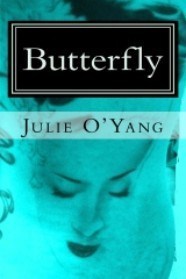 Let me ask you a question: is the cover of your novel “Butterfly” art? If so, what did you do that made it so? I would actually call it delicious, which suggests a cross between great food and art.
Let me ask you a question: is the cover of your novel “Butterfly” art? If so, what did you do that made it so? I would actually call it delicious, which suggests a cross between great food and art.
J O’Y: Oh, you don’t touch “Food”, Food is the Chinese religion. But yes, the cover of my book. It is art when the creator brings the work in contact with the external world and thus by way of interaction adds his contribution to the creative act. Marcel Duchamp’s Fountain is art because it communicates. Art can’t perform itself. For me Art is communication, if not, it is not. So you said literature is the only art you really understand as a maker. How can we make literature “talk” without being dull. Do you think fiction is worth the trouble? I mean it has almost become a cliché to remark the decline of literature, art, decline of anything.
[image error]
MS: I used the Fountain by Duchamp as a profile photo for a while. It lead to curious email exchanges with Americans (no, I have no explanation for this that would also be politically correct). The fountain talks to me, it didn’t talk to them or if it did talk, it talked gibberish. I found it crystal-clear. The fountain said “don’t be dull”. But it also told me: “If you think you could turn anything upside down now and call it Art because I did you’re sorely mistaken.” So I believe there’s more to it than communication. To original Art at least which is, I think the only art worth doing. Literature ditto, I think. Harder to grasp at times. A pet topic of mine, really: writing that is “fake good”; that pretends to have something to say but it doesn’t really. This type of writing is very fashionable nowadays (but I’m not going to name names because I want to keep my knee-caps intact). So by implication: yes, I do think Fiction is worth the trouble. You make the world, or you make the world anew, or you make the world whole by writing something that is true. This aspect of art has been sorely in decline indeed. Perhaps this is just a phase though like an ice age. I don’t mind living in an ice age though: I got fur mittens.
[image error]Coming back to your book: was it worth the trouble? I’ve not really finished a novel myself (though I’ve written a few if that makes sense) so I’m truly curious how it feels. (MS waits) — You don’t want to talk about the cover of your book. Fine with me. Don’t then…it does talk, that cover. It whispers “butterfly”. Incidentally, I’m a fan of butterflies. In my writing, there are plenty of butterflies. And dragons. I like those, too.
JOY: Then I am dragonfly. Near the city I grew up as a child, we used to go to the mountains to catch huge dragonflies in the summer. Green-bluish monsters, they bite like hell (laughs).
Writing for me is like breathing. Is breathing worth the trouble? I’m not sure but I am doing it every minute. It’s not up to me.I’m stealing from one of your interviews in which the interviewer touched the subject. “The birth of the reader must be at the cost of the death of the Author.” Can you tell us something about the (re)birth of short/flash fiction and its popularity in Germany?
[image error]
Totally screwed up writer’s DNA
MS: You’re a thief but that’s fair game: it’s written in the DNA of all artists. I’ve seen this Barthes quote before: at > kill author, a journal that build every issue like a tome over the bones of a dead author. Otherwise, this is typical French philosophy, which is either too obvious or too weird. This one is too obvious for me. It does make me think of death though, as did the opening paragraph of your novel: the odour of death vs. the scent of perfume…
I don’t want to answer another question on flash ever. I’m flashed out. I know nothing of flash in Germany, and I really only write short stories as a form of exercise. Though I get a lot of them written because I can hardly make myself finish anything. Do you know this problem? How many novels did you start until you finished “Butterfly”? Or why not?
J O’Y: I know the problem, that is: I can imagine. You know, I am one of those Asian robots, once you push “start” you can’t make them stop. But seriously, I always finish once I get started on something. It’s a sort of constant euphoria. Perhaps that’s why I don’t always like the end result. Creating is a mediumistic experience, the creator is bending physical and chemical laws, and it doesn’t always feel comfortable to return to this-reality. It never is…Which reminds me another quotes I found on your website. “Writing is the only way to cope with memories.” Which memories are you talking about? Is that the reason why you chose to write in English other than German? To be a better, less ordinary observer? What are the advantages of the bilingual process? Because I don’t think there are disadvantages.
[image error]
Not a robot butt but a real butt.
MS: What is it with Asians and robots? The other day I saw a robot butt designed in Japan. Will everyone want one when they come out? Will it make farting trendy? Perhaps Asians love robots to cope with the future. Perhaps the robot is the medium; if you’re right about that “mediumistic experience” of writing (I concur) then writers would be great companions for robots. We should write a novel about a writer and his (her) robot together! I totally sympathize with the need for robots. I’m a huge robot fan myself. I need the hope that there will be true robots one day to cope. Remembering is another way to cope with memories. But I like that thought of yours, which never occurred to me. The reason why I opted for English instead of my native tongue is probably because my writing mind awoke in the midst of English culture and was further nurtured by my English-speaking family environment. To me, one disadvantage is my constant guilt feeling towards my mother tongue (perhaps that’s just another form of guilt towards my mother?); the distance of outside observation using English as a tool is also painful. It’d be so much cosier to just be one with my world; alas, I’m two (at least).
What about your own bilinguality? What’s your passion? I read that you were born in China, live in the Netherlands (where I studied and worked for a while, odd little place), studied Japanese. But you write in English and here you are chatting with a German (I presume you like the whole Berlin thing?) … somewhere, Jeanette Winterson says “The measure of love is loss”. Do you love English?
J O’Y: Everything in writing begins with language. Language begins with listening. The thing is I don’t have the opportunity to hear the Chinese language, to perceive sounds and make them my daily experience. I have a salad bar in my head, I have a salad bar circle of friends. It just feels natural to me. So yes, the whole Berlin thing is great, I love it! I believe it’s more or less “correct” mirror of our time we are living in. I love the English language; I do. Such as Jeremy Irons speaks in Brideshead Revisited, so… appetizing.
[image error]
The Spanish inquisition in the Netherlands.
Marcus, What was your experience in The Netherlands? They said that Heinrich Heine said that in the Netherlands everything happens fifty years later than anywhere else. The Dutch themselves believe they are a forward-looking nation.
MS: Your statements are challenges. I accept. My writing doesn’t begin with language, it begins with a wordless, shapeless urge that I can’t name which drives me crazy, gives rise to an image or a set of images until I manage (sometimes) to channel the urge into a sentence. Language comes last. Now the technical writing can begin.
I love that idea of the “salad bar in my head”. What a wonderful scene. Jeremy Irons is scary. The Netherlands aren’t. They were once, when the Dutch were colonial geezers, but now they’re modeling what it means to be civilized for the rest of Europe. Didn’t know Heine was down on them—well, he loved the French. We all love the French, love to hate them. Honestly, I think they’re forward-looking today (the Dutch) albeit a tad boring. But being a role model is boring (laughs).
JOY: “It will never rain roses: when we want to have more roses, we must plant more roses.” Which roses? Creating a new sense & sensation, do you? (What kind of food do you like the most? What’s your favourite dish? Do you cook?)
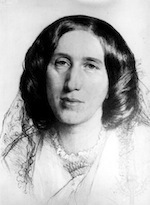
George Eliot (Mary Ann Evans)
MS: in German we have this saying “jemandem ein Loch in den Bauch fragen”—pester someone with questions is like “asking a hole in his belly”. German’s very grounded in medieval lingual and cultural oddities. Roses are odd flowers. I can’t say I like them, but I love Mary Ann Evans (George Eliot) who said this. I imagine she was a bit tortured as a person and writer, trying to make the best of her erotic talents in Victorian England, and which flower is more tortured, and promises more torture than the rose? Food is a different question (book even) altogether: I don’t cook, my wife does, and whatever she cooks is what I like best. I’m a creative eater though. Right now, we’re going through a large number of Tapas dishes (a good fit for the hot weather). How about you? Both roses and food (I can’t let you off the hook now)—butterflies don’t come to roses, do they? And can you cook Chinese (I’d like that)?
J O’Y: Mutabilis, do you know the rose? The flower doesn’t fade, instead it darkens with showy, distinct coloration. The single petals open sulphur yellow, changing through orange to a rich pink and finally crimson. Before you know, you have a whole collection of bright, silky, multi-coloured butterflies settling on the bush in your garden. Mutabilis’ common name is Butterfly Rose. I don’t know why it’s also called The China Rose. I cook Chinese but not so well. I prefer to eat. I love food in general, however Italian and Chinese, La cucina piccola fal la casa grande. It’s like a book – a book is like a kitchen carried in your pocket. Now I’m saying this, it seems we have reached the point to talk about “the size”. There is a passage I’d like to quote from your website with reference to the “literary size”.
“Contemporary things in prose can have value appropriate to the contemporary psyche only if they’re written in one sitting. Reflections or recollections of twenty of thirty lines—say, at the maximum a hundred lines—that’s the contemporary novel.” Do you think you can tell us of your vision? And the role of New Technology?
[image error]
Uncle Stalin. Neither pretty nor pleasant former dictator of the Soviet Union.
MS: you’re quoting quotes back at me, how rude (laughs). This one is by Yuri Olesha, one of the great modern Russian novelists who wrote “No day without a line.” When Olesha lived and wrote — Stalinist Russia — minutes might have been more precious, I don’t know. Russia defies analysis though it is endlessly fascinating as are its writers, poets, bards. One of my best friends is Russian and he has the heart of a poet, too. Otherwise, I don’t think I believe this statement at all. I probably picked it because I needed a justification for my own flash. I’m over that now. There’s no justification for my own flash. I’m over that now. There’s no justification for flash, and none is needed either. And I’m over flash, too. Did I say that already, in a flash? Do you flash? And if so, where?…New technology, OMG. No, you go. These five syllables make me feel sleepy. Say something surprising, please?Image: Uncle Stalin. Neither pretty nor pleasant former dictator of the Soviet Union.
J O’Y: Your first question. I’m running a project on my website, U-R (check it here). I call mine “tablet-size reads”, which are slightly different than flash. It’s my own concept, my own universe and my own logic. I like to work like that.
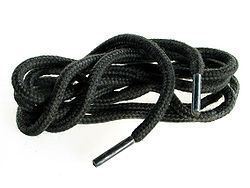
Experts say Super Strings could lead to a unified Grand Theory of shoelaces
As for your second question. You are German, aren’t you? I thought machines and stuff turn you guys on, no? You were a particle physicist. Could you explain Super String Theory in five comprehensible sentences? By comprehensible I mean in a literary way…
MS: cool — I LOVE technology to tell the truth. I love tech projects, too. Ultra-Reads reminds me of Movellas where they’re trying to build a whole portal based on palm-sized prose for hand-held devices. Your texts are ultra-lovely by the way. In “The Kite”: «My brother and I thought: “What is glass? What are the facts and certainty?”» I like that influx of existentialism in your writing.
Let me be fast about the facts: I am German (though my wife says it doesn’t show); I won’t say what turns me on (there must be limits); I was a particle physicist, now I’m but a particle. Super String Theory (off the top of my head): (1) the universe is a mystery. (2) Physicists are passionate, curious people, who know this. (3) All physicists feel enormous pressure to have to explain the world to non-physicists. (4) Super String Theory can easily be explained in five sentences. (5) With Wittgenstein, the world cannot be explained in any number of sentences. (Perhaps this is what the world is—a sentence?) — What do you say? Seriously though, when I was a student I once spent an entire train ride of 6 hours explaining physics to an old lady. In the end she shook her head, that was all, and thanked me and left. I understood.
(Image: Ludwig Wittgenstein believed in dissolving philosophical problems by acts of word-magic. Alas, his successors were not been able to repeat his feats hence we’re still plagued by philosophy. Photo by Ben Richards.)
JOY: I imagine that our Universe is a big computer and the Creator is a gamer using I Ching as his User’s guide. I Ching is nothing but a jumbo of binary constructions and riddles. I LOVE physics. Nerdy stuff fascinates me. A few days ago I was working in my U-R project, and I wrote about my protagonists, two children, “…We wanted to steal a glimpse of Eden carefully, scientifically designed by ourselves. Scientific, because we engaged equation in our reasoning. We calculated the shapes of leaves that grew on the flowing branches aeons ago before the tree turned itself into ominous, tough and unbending cement. The dodgy science taught us that it was a bodhi tree of heart-shaped leaves. And for one thing, Paradise is allergic to humans. ”
Next. “…One good heart-break will furnish the poet with many songs, and the novelist with a considerable number of novels. But they must have hearts that can break.” This is my last question. Do you want to have a drink with me after our conversation? I realise it’s strange because I asked you for a drink with me. But let’s say I can say no to you, would that be enough for one heart-break? Would that give birth to a novel or at least 20 lines?
MS: That’s one of my favorite quotes from one of my favorite writers’ writers, Edith Wharton. For me, this encapsulates the need to not just write anything about anyone or anything provided it’s well written, but to write with a moral sense that art can make the world better, to put it simply. John Gardner is a more modern prophet of this gospel, and there’s a legion of writers who write damn well but so damn heartless that it makes my blood stand still. I’m curious, is there a moral message in “Butterfly”? Do you know what I’m talking about?
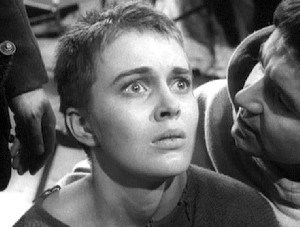
“You’ve been a bad girl”; Photo: still from Saint Joan, a film by Otto Preminger, 1957.
Any one coffee date with any one woman would be enough to fill a novel. Twenty lines might leave me hungry for more. And I’m not talking about coffee now. But you asked for it. Bad girl.
J O’Y: Well, I’m spicing up our conversation so people won’t fall asleep. Fighting the overwhelming yawn- factor, I am Saint Joan!
I don’t know if I wanted convey a moral message through my novel(s), I’m not sure. I want to tell a good story in the first place, and if there is a message of sorts – it’s up to my readers – I want it to be challenging. Reigan, my male lead from my novel is a medical doctor. At the beginning of the story, he says to his patient when he visits her in her sickroom: “These days there are a great many books about trauma and its effects on our country’s one point three billion poor souls. Poppycock recipe. We are the aristocrats privileged with a past.” The secret sickroom is the doorway to a painful memory, to repressed history of the Chinese past. In China many things have happened; the mess called history is also our cure. On the other hand, I’d like to think that history is more than a lesson. It’s chocolate. Although chocolate tastes like heaven and makes you smile, there are some disadvantages associated with eating this rich food. It contains high fat and sugar percentage and low vitamin, it is even toxic and can poison your dog! Yes, everything can be too much for a human life.
And then, the Rape of Nanking is one of the main focuses of my novel. I deal with violence. I like to explore human brutality and cruelty not to moralise. I’m not interested in preaching. Violence can radically reshape civilisation. Great changes have occurred in civilisations when cultures of war, heroism and rampant misogyny invaded and stamped out a more benign, nature-based, world view. Take the fall of Troy – and perhaps as a result – a whole way of seeing life, death, women and immortality was mythically reshaped to frame a justification for the harsh rules of patriarchy. Please understand, I’m not propagating war either. I like to play with thoughts.
Message (or the lack of it) aside, while I was writing Butterfly, I was ever more consciously exploring an unnamed aspect of written words. Have you ever tried to walk carrying a grand piano on your back? You’ve got to be that strong to be able to finish a book, ask any writer. A strong body makes the mind strong. The human body has two ends on it: one to create with and one to sit on. So I guess there are two category of writers: creative inspirators and sitters (as luck would have it, in Chinese writer and sitter have exactly the same pronunciation.) Unfortunately I must say, the majority of writers belongs to the bleak category. It’s a tough profession, a tough world out there. But you are either an artist or you are not.
[image error]
William Blake: Charon and the damned souls.
The process of writing a novel is very musical. For me it’s very much similar to singing and dancing; its physical sense makes much more sense to me. The body tries to tell the truth whereas thoughts tell lies. Give all your thoughts to the body. You get into the rhythm and the rhythmics of how your protagonists are. The body is meant to be seen, not all covered up in powder and paint. So is writing. It is William Blake who said that the body was the soul’s prison unless the five senses are fully developed and open. Blake considered the senses the “windows of the soul.” So yes, quite plainly put, writing for me is like having sex that can transcend me as well as my reader to a mystical experience.
[image error]Marcus Speh lives in Prenzlauer Berg, Berlin, Germany, near a large selection of fine coffee houses and writers. He’s a writer, ex-particle physicist, professor, father, husband, former fencer and paratrooper. His flash fiction has been published all over the place, but it’s tiny so you might not find it. However, you’re in luck: in 2012, MadHat Press will publish a collection of his best short fiction titled “Thank You For Your Sperm”. His flash novel “Gizella” will be published in 2013 by Folded Word Press. Since 2010, Marcus has given 14 interviews including this one, and he’s tried hard not to repeat himself too much but probably failed. Probably failed. Probably failed. This is his blog.
[image error]Julie O’Yang is a novelist and visual artist based in The Netherlands. Born and brought up in China, Julie O’Yang came to Europe in 1990s to study at the University of London. Then she read Japanese Language and Culture at the University of Leiden, Holland, and Tokyo, Japan. Her fiction, short fiction, poetry and articles have appeared in publications worldwide. Her most recently novel Butterfly has received praises from global audiences as well as international literary and art scene. Known for her unique literary voice both daring and challengingly contemporary, she is a forerunner and trendsetter of media reforms and 21th century indie publishing. Julie O’Yang is on Facebook, Twitter and YouTube and has a blog.








May 20, 2012
How Is The Internet Changing The Way You Write?
[image error]1. Perambulating. This is not at all the post I meant to write when I began to think about it this morning. Only half way through the original post I realised that my attention was elsewhere—probably because of a talk about online identities I had to give in the following week (in Berlin in German) on the way the Web has changed the way we do science, a talk that I’ll give again (differently) in London next month and yet again (differently) to an audience in Stockholm. This habit of continously changing lanes of thought, moving in and out of ideas is one way in which my thinking has changed. Or rather, I’ve always done that—in a recent interview for Flash Frontier I admitted that “I’m a lateral thinker and writer and it takes strength to keep the reins and carve out tracks deep enough so that others can follow my crabbed path later.”
The Internet’s not making it easier to keep a tight rein on one’s thoughts or lines…
What helped me to the insight of what I really wanted to write about (which is this what I’m writing about now in case you were wondering about my meandering…) is the way in which I sit here and write while weaving in and out of the Web. My browsing history in the past few hours include sites related to my research on virtual identities (Wikiversity, Google Books), social media sites (Twitter, Blogger), statistics information and general reference (dictionary), covering the broad areas of: learning, sharing and vanity. All of it while trying to write a blog post (sharing, vanity) about something that I’m curious about (learning).
[image error]2. Modeling. Now, if this was an MBA course, I’d draw a triangle (see fun and Freud in the figure) with ‘learning’, ‘sharing’ and ‘vanity’ in its corners, and perhaps I’d draw another triangle with the corresponding Freudian spaces ‘id’ (sharing), ‘super-ego’ (learning) and ‘ego’ (vanity) next to it, because I’m so fond of all things Sigmund (in part because the man wrote so damn well). But this is not an MBA course and I must get back to my original question and to writing.
How then is the Internet (or rather, the Web, which is what most people, although it is technically incorrect to do so, identify with the Internet) changing the way I write?
W. Daniel Hillis, in an introduction to the similar EDGE question, calls our time “the dawn of entanglement”. We’re perhaps not more entangled than we ever were (one of the privileges of getting older besides losing your teeth is the insight into how terribly and beautifully connected we all are at all times) but there’s a greater consciousness of this fact in the world.
I’m going to leave the plane of abstraction now and tell you some things that actually happened:
3. Writing. A couple of days ago, I saw a picture of Fritz Thyssen, a German industrialist who helped bring Hitler to power and later fell from the Führer’s grace, on Jürgen Fauth’s Tumblr site “Tulpendiebe”.
[image error]The next morning I woke up with a story on my mind focusing on how Thyssen visited Hermann Göring in his Nuremberg prison cell in 1946 (something that never happened as far as I know).
I spent some time researching the facts surrounding Göring on the net. I found stuff out and I got excited, hopping from page to page like a rabbit, pen and mouse in hand (I do take notes in longhand, too).
I had started with one sentence that had bubbled up from my unconscious. After half a day or so I’d arrived at a pretty clear idea for a story linking the 1946 Nuremberg trials, the Beer-Hall-Putsch of 1923 and my desire to take a different look at fascism and its characters (which is one of my long-running secret projects, at least until this post).
I sat down and wrote my short story, going back to some of the web pages I’d saved and finding new ones along the way. This finding of new information and new ideas set in motion a more complicated process because I now had to defend my chosen course while the Web constantly whispered in my ear.
The tale itself is a story of entanglement. It could probably have been written between library visits, but my muse at least is a beautiful, moody cow: when she calls, I need to milk while the juice’s warm. I might never have written this story otherwise, not this one anyway.
4. Translating. A third dimension, discussed in the aforementioned recent interview is the going back and forth between German and English which, in this case, never left the level of individual words: I tend to look up a lot of words even if I know them; I don’t do this consciously while I do it. In hindsight, I think it helps me broaden my base of choices—something that every literary writer likes to do—avoid repetition or cliche.
As an early user (since 1990) I’ve not really been without the Web ever. As a writer, doing serious work since about 10 years, I’ve benefitted enormously from the growing density of information. This richness comes at a price: it is harder at times to find one’s way. First there’s a billion roads inside your head and then there’s another billion Internet highways outside your head. “We’re not in Kansas anymore,” says Toto to Dorothy. On the Internet nobody knows you’re a dog.
The Web operates like an external memory bank. It has become an ocean whose waves quietly lap at the back of my brain while I think and while I write. It contains all manner of creatures. I’m excited to see which ones will crawl out of this “Urschleim”, this primordial soup and find their way into the pages of my writing.
[image error]5. Asking. Now, all this was written in smoothie mode: put it all in, turn on the mixer, pour out the slush. There’s so much more to be said about how the Internet changes the way one writes, but I can’t get my four hands around it yet. I only wanted to get the ball rolling.
Here are a few recent witnesses from my blog roll: Alt Lit (like Noah Cicero on American literature in the absence of “honor” and “duty”); sad true habits of highly effective writers (like the commitment of Roxane Gay and others); people creating all over the place (like my 11-year old daughter Taffimai’s ambition-free web art exhibit); writers wondering why they do what they do (like Jim Davis & friends on Fictionaut); remixes and mash-ups (like Jürgen Fauth’s Tulpendiebe). So much to digest, read, digest, read.
How has the Internet changed the way you write?








May 9, 2012
Subtle is the Lord — Te Nave Nave Fenua
"Te Nave Nave Fenua" (The Delightful Land) by Paul Gauguin, 1892
I have [P]interests, too. Mostly, I pin things to my Litboard and write a few lines about them. Sometimes, these different Internet places where I’m invested strike me as tiny parallel universes. They’re too tiny to be fully grown or able to do much for you. They never assume full responsibility for their content. You spend perhaps only seconds or a few minutes in each of them, but all of them together (Facebook, Google+, Pinterest, Fictionaut, Twitter, ScoopIt, Storify, WordPress, Tumblr, Posterous, Weebly etc.) manifest something more than just a bunch of sites. I don’t really know myself yet how exactly this works, but the totality of alternative electronic worlds is subject to an evolutionary process not unlike the physical universe as such: …these platforms can be grafted upon one another (mash-up, merger) or compete with each other [image error](Facebook, Google+) and so on, with a profound difference to the biological arena being that we, little me and little you, are not just standing by but we play with them and inside them (always the danger of losing ourselves in the process), we worry about them, we recommend them, we kick them like dirty old habits. This means that we’re like gods in the midst of these informational universes that we’ve made (and I mean all of us, because only where people to go play and pin and post and palaver will there be life). Maybe this is also what other, larger, invisible gods do to our planet and all the other planets. Perhaps the green trees, all of them that I see and can’t see, the whole planetary network of trees, is a community platform of divine gardeners.
[image error]When I was a boy, I had this idea first, as soon as I’d grasped the unreal reality of atoms: what if there was a giant child somewhere within, our world nothing but an atom in the little finger of this giant child. Just like perhaps an atom in my little finger was a complete world with a child looking up at me in this moment having the same thoughts. Dr Seuss and T Pratchett must’ve had this thought, too. It’s the Cosmic Turtle for beginners.
[image error]This whole linked chain of thoughts makes me feel like a spark with notions of my own divinity. It was set in motion really when I pinned a lovely post by anonymous blogger and writer Beachsloth to my Litboard: it reminded me that I’m a physicist by training, something that lingers in my mind like a mirage on a desert road behind me rather than ahead of me. I’ve not used this fact much in my writing but perhaps I’ll do more of that. Right now I’m working on a little story that involves Einstein and I’m happy to feel just a little closer to him than if I wasn’t a physicist. Not that it’s really possible to feel close to a cultural icon: they hang on the wall. They’ve been pinned there by history (did you know there’re more than 116 Million images of Einstein on the Web?). To close, let’s remember that we’re sparks and gods at the same time. We’ve created this digital Garden of Eden and we copulate in it at the same time. We put ourselves here and we toy with banning ourselves from it, at least I do, all the time.
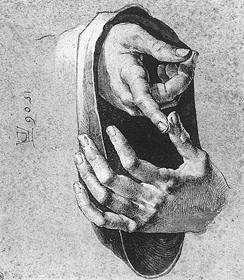 Earlier in the week, a group of students asked me a question that I’m often asked: how do I find the time to do all that I do?I told them that I try to be efficient on a day-to-day basis (as I’m sure we all do), and that I only survive in digital Eden because every once in a while I take a solid break from it. Usually, this cycle follows my teaching term. When I’m on a media break, I pay a lot more attention to my body. I look at my hands and I notice new lines on them. I sit with my hands in my lap rather than on my laptop and look out the window. I read to my loved ones. I roll words around in my mouth and swallow them whole, or I chew them for long periods. At the end of it I can do all kinds of things with words that I couldn’t do before. And that’s only a fraction of it. When I’m done with that, I resurrect myself and return to the Delightful Land to play some more with you guys.
Earlier in the week, a group of students asked me a question that I’m often asked: how do I find the time to do all that I do?I told them that I try to be efficient on a day-to-day basis (as I’m sure we all do), and that I only survive in digital Eden because every once in a while I take a solid break from it. Usually, this cycle follows my teaching term. When I’m on a media break, I pay a lot more attention to my body. I look at my hands and I notice new lines on them. I sit with my hands in my lap rather than on my laptop and look out the window. I read to my loved ones. I roll words around in my mouth and swallow them whole, or I chew them for long periods. At the end of it I can do all kinds of things with words that I couldn’t do before. And that’s only a fraction of it. When I’m done with that, I resurrect myself and return to the Delightful Land to play some more with you guys.








April 21, 2012
Up the stairs with Aesop








March 18, 2012
Spring Things To Do
Matilde Urrutia and Pablo Neruda in Isla Negra: "I want To do with you what spring does with the cherry trees."
This spring I will forsake all donations in the form of soft compliments. Those that I have received already I will convert into hard currency. I will be my own arrow and my own target. I will practice putting my inner princess to work. There will be frogs available for lower prices than ever in the history of fairy tales.
One spring, years ago, it rained warm water out of nowhere. I was on a date with a girl who lived with a much older man. She took off her shoes and I took off mine. Then we ran through the rain to find shelter. After a while we realised that we didn't need protection from ourselves. We laid down on the grass and I kissed the water off her neck. It was such a sweet waste of time with all that rain coming down on us from above all the while.
[image error]
Friend of human hair: the common bed bug
Console myself with pink hair ribbons though I don't have much hair but I have women in my life and through these women hair inevitably falls over my eyes when a woman for example puts her head her beautiful head next to mine and shakes her mane then the hair will frame my face as if it was my own and at the end of each hair hangs a promise because that is what hair is a promise of youth.
Localize exactly the place in the centre of my chest where the hurt and the pain sit. Talk to them quietly and patiently, without losing my breath. Talk to them in the tongue they understand. Forgive where forgiveness is appropriate, but also extract those few names to which revenge is attached like a tarred angel with a grimace instead of a smile. I will then plot my revenge and I will dig up the knives buried in the garden of my mother and thrust them into the hearts of the deserving.
[image error]This spring I will, for the first time, write every single word as if it were the first word ever written. If a word feels used in any way, I will wag my finger and force it back into my malleable mind like a spaghetti strand hanging out of the side of my half-open mouth. Like a broken string it must be removed from the instrument of my art, which is both airy and rocky, both watery and shiny as metal. It may be that, when spring is over and summer beckons, I will be down to three usable words, or down to two, or even one, and I am looking forward to finding out what word that is.
When I pass a church this spring, I will bring my paints and my brushes to color the dark aisles and turrets, the towers and transepts. When I meet a monk, a deacon, a priest or a bishop even, I will touch them with my brush. They will fall silent and look at the red, green and blue as if they had never seen colors before. I may even seek out the pope and leave a stain of hue on his white robe. Christendom, I will say to him, deserves better than black and white.
[image error]
Forever young: pizza boy.
Once, I wore a uniform and the winter had been very cold. Unsure of my true powers, I flew through the air like a sad icicle, clutching my weapon. On a spring weekend, I took a girl out for pizza. I didn't care about the food at all, I only cared about her feelings for me, but she kept talking about the dough and the right crust; she must have had a past life in Italy. I swear, she killed me there on the bench with her fascination for pizza. They could have fed me rat tails with oyster sauce. I only wanted her to look at me and lose herself in my greyblue eyes and in my words. Instead, she obsessed about tomato slices. More than anything I remember her dislike of artichokes. Life serves weird memories sometimes.
[image error]
Tired Giacometti by Herbert Matter: «Artistically I am still a child with a whole life ahead of me to discover and create. I want something, but I won
This spring I will befriend time and leave space to play alone. I will look up and wait for warm rain. I will take my shoes off. I will explore fruit from the inside. I will take care to be dirty. I will measure my full weight in letters, stuff myself in a padded envelope and send me off to Señor Agustin Primavera who lives with a three-legged dog in the last house on the southern most street of the world where he speaks long Spanish poems into the foam of the sea. This is the place where spring comes to anchor for the rest of the year when all is done and the people are ready for summer. Señor Primavera will open the letter thriftily, with swift hands like Santa Claus opening the letters of children from everywhere. He will take one look at my transformed self and, I hope, he will smile with appreciation at the gesture and name a condiment after me.

February 23, 2012
books that burn turn into torches
Comic book burning
Read an interesting article in the NYT blog by Tim Parks, "E-Books Can't Burn". It's a good read, but the comments impressed me even more than the post itself: such passion on either side! Surely a sign of paradigm change, except as usual it isn't clear where we're going. Of course, the paper-based hardliners don't show up on the blog, only those who swing both ways.
[image error]
Grapes of Wrath burning
It seems to me that the original article missed out on the community aspect of electronic reading: in my life as a writer and reader of English literature and texts who doesn't live in an English-speaking country, this aspect has almost come to dominate my literary experience: the ability to comment; to post material and have it be seen and read almost instantly; communities of friends springing up around reading and writing (e.g. Fictionaut, Red Lemonade etc.) Annotations no longer only in the margin. Of course, it can all get too much.
[image error]
Books burn in China
In my own e-book reading practice, I use the devices (I own both a Kindle and an iPad) for reading on the go, rarely very focused, or to check (free) first chapters and samples, or to keep books with me that I might want to look at, or as a repository for books that I might want to read once but not ever again (and therefore I don't want to own them). But my central reading experience must still be visceral, and it is based on owning books that I love, too.
[image error]
Books burn in Russia
As an avid reader and writer I still remain split right through the middle regarding the ebook or print book question (the "or" is, I think, generally overrated): I carry both paper and portable. Sometimes I wake up in the morning with the taste of a printed page in my mouth…not that I'm in the habit of licking paper, but my entire metabolism grew in the midst of a large collection of paper-based books and my being grew towards them. So much so that I physically feel the need to go into book stores or libraries sometimes just to be around books. Though I an beginning to feel the same about online scents and sensations: the need to see what's been written, said, played online has been such a strong factor in my life over the past 20 years that I can hardly remember a world without it. And you can't either probably?
[image error]
Nazi book burning memorial
I remember my father in the 1980s handing me a book that my grandfather had kept hidden from the Nazis. It made it the more precious because it could have been burnt but this particular copy hadn't been burned, you see. The fact that it might have burnt made it so valuable to him, to me, and even to all of you who haven't even held it, because I think you know what I'm talking about: the book was printed freedom, pure passion, a force, not just a collection of flammable material plus words. Books that burn turn into torches.
[image error]
Early Christian book burning
As this summary of 14 (!) book burnings throughout history shows (see all photos on this page), book burning has been almost a sport for more than a thousand years. Who knows what it'd do to society if the burning would be replaced by Dr Strangelove's press of a button?
"You must write every single day of your life… You must lurk in libraries and climb the stacks like ladders to sniff books like perfumes and wear books like hats upon your crazy heads… may you be in love every day for the next 20,000 days. And out of that love, remake a world." —Ray Bradbury

February 20, 2012
The Sentinel
«Chandra X-Ray flies around the Earth. For Chandra, day is night and night is day. It keeps picking at the skies. It harvests cherries and plums and sends them to Earth where scientists put them in pressure chambers, map them out on large walls, draw lines, analyze, speculate and fantasticulate until they are completely confused. Nobody thinks of just enjoying the fruit of the heavens while they're still fresh after their aeonic flight. But deep inside Chandra hides a small being of uncertain composition. It takes the pictures and patterns, the cherries, plums and the berries and turns them into texts. It feeds the stories to the onboard computer. The computer sends them to Earth using secret channels only known to double dead double agents. On Earth, the space fragments resurface as figments of writerly imagination. None of the people on the planet have any idea of any of this.»


